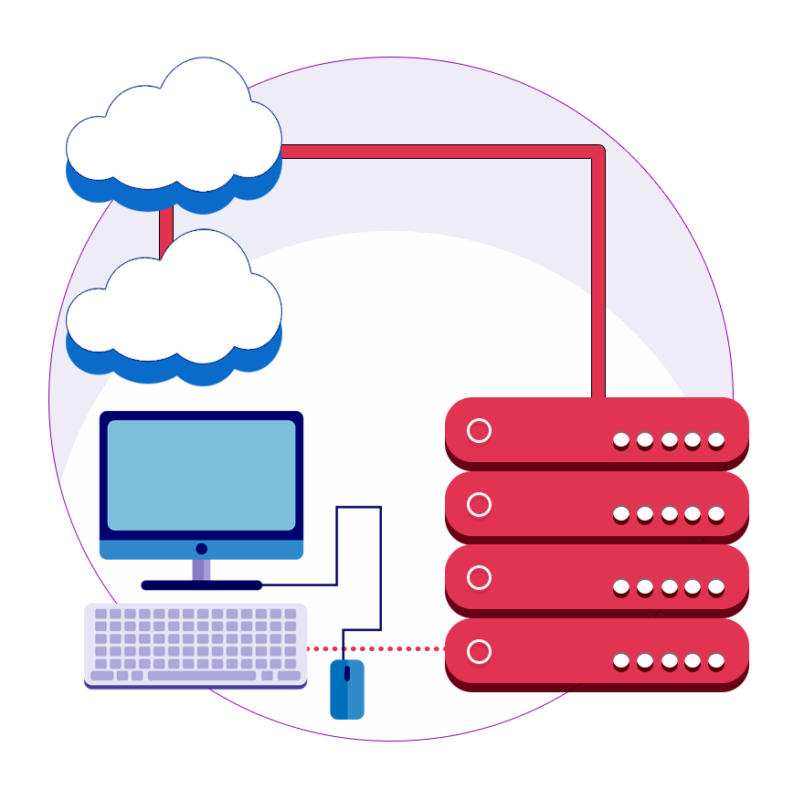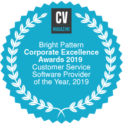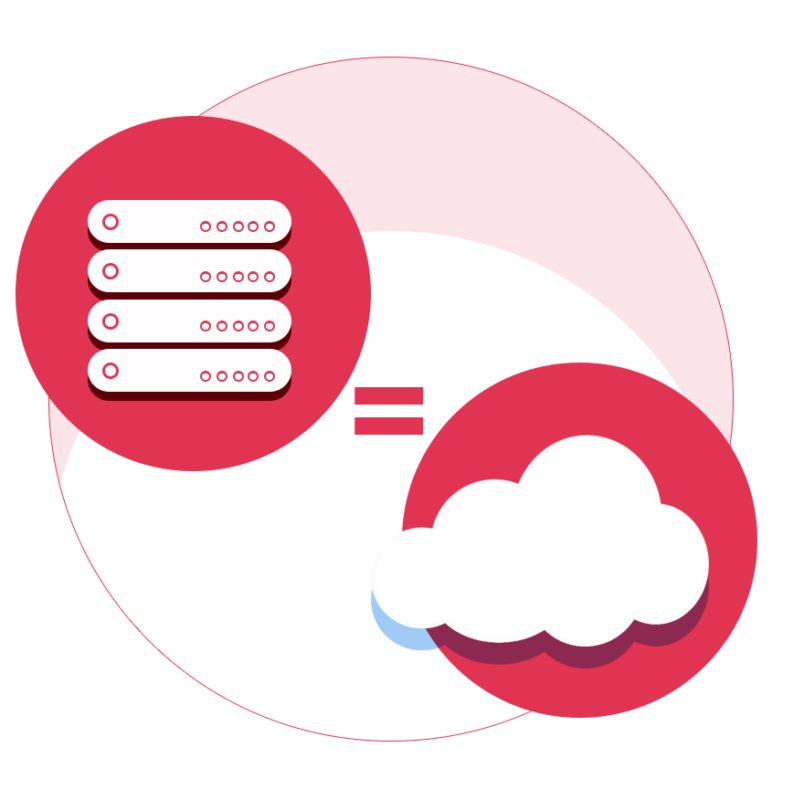- Products
- Pricing
- Solutions
- Partners
- About US
Bright Pattern AI-Powered Contact Center Solution, Same Software Available on Cloud, Private Cloud, and On-Premise
Bright Pattern’s On-Premise and Private Cloud Contact Center Solutions











In addition to Bright Pattern’s CCaaS offerings, Bright Pattern also offers the same software on-premise and on private cloud. Bright Pattern’s on-premise and private cloud solutions have the exact same powerful features and functionalities as Bright Pattern’s cloud-based solution, including omnichannel communications, AI-powered quality management, AI-powered interaction analytics, comprehensive CRM integrations, and more. Whether you choose public cloud, private cloud, or on-premise, your software will always receive the most updated software, ensuring that your contact center has instant access to the latest features to adapt to the most modern customer experience expectations.

When the cloud platform upgrades, the premise platform will be upgraded as well. Our premise solution has all of the features of our cloud solution and is continuously upgraded to be as capable and feature-rich as our main cloud offering. Get access immediately to Bright Pattern’s latest developments and features, including such additional modules as the Bright Pattern AI suite and WFM.
Because the on-premise software is the exact same as our cloud software, Bright Pattern can quickly and easily move your Bright Pattern contact center platform to the cloud if and when required. No agent retraining is required, all of the data can be transferred, and this move from on-premise to the cloud can be done without any interruption to your business.
Bright Pattern’s software is a modern, innovative contact center platform that is fully omnichannel and driven by advanced AI. While many other on-premise solutions are not modernized and not updated, Bright Patterns on-premise call center solutions are the most advanced on the market and continuously updated with new features. Bright Pattern features all digital and traditional channels, like voice, email, SMS, text messaging, messenger apps, video chat, mobile app, social media, and more. AI new and advanced unique features like conversational IVR, quality management, auto-scoring, customer intent analytics, interaction analytics and more.

Bright Pattern leverages AI to power key features as part of the Bright Pattern AI Suite. These AI features power features like:
Self-Service
Natural Language Processing and Large Language Models allow contact centers to create advanced chatbots and conversational IVRs.
Quality Management
All interactions can be analyzed, and interactions that are detected as negative can be singled out for supervisors to analyze, leaving no interaction unchecked.
Interaction Analytics
Analyze all interactions on every channel.
Real-Time Agent Assistance
Bright Pattern features a teleprompter and allows contact centers to set conversation goals for the agent to fulfill. Agents will receive suggested responses and a conversation checklist to help them guide conversations toward business objectives.
Customer Intent
AI can analyze all interactions and detect keywords or emotions that constantly pop up in the contact center. Customer intent can be used to study market trends, determine customer journey pain points, and find overall business trends.
Auto Scoring
AI can analyze all interactions and detect keywords or emotions that constantly pop up in the contact center. Customer intent can be used to study market trends, determine customer journey pain points, and find overall business trends.
One of the main reasons customers choose an on-premise or private cloud solution is due to legal and regulatory requirements. Some governments require certain industries to adhere to specific requirements around data security and privacy. This means that some countries can prevent public cloud deployments for data security and privacy reasons. This is most common in industries such as finance, healthcare, insurance, public sector, and government.

Enjoy full data sovereignty. Keep data transmission and storage secure with your own country or region’s boundaries. Bright Pattern’s platform offers full data sovereignty through a number of features:
When your business or organization is looking for an on-premise contact center solution, there are a couple of really important things to consider:
Bright Pattern’s powerful AI-driven omnichannel contact center software can be hosted on your private cloud data center. Get access to all modern AI-driven contact center features, with the software and data being hosted on your own data centers so your business can maintain data sovereignty and follow a custom set of security and compliance requirements.


Bright Pattern allows your business to use a combination of on-premise and cloud. Pick and choose what you want on the cloud and what you want on-premise, including aspects like software features, reporting, data storage, data handling, and more. Bright Pattern is a flexible solution that can be tailored to your specific business needs.
Should you choose to be on the cloud instead, Bright Pattern can quickly and easily move your Bright Pattern contact center platform to the cloud. It is the exact same platform on both on-premise and on the cloud. No agent retraining is required and this move from on-premise to the cloud can happen in a matter of days.


There are many great reasons for businesses to continue staying on-premise.
One of the main reasons a business chooses to stay on-premise is because of data security. Many call centers, especially ones that service sectors like the government or financial institutions, handle a large amount of private information. To keep this data confidential, these institutions prefer to keep their data stored in their own data centers.
Another reason businesses choose to stay on-premise is because of the use of legacy systems within their workflow or CX ecosystem. For businesses on legacy systems and require these legacy systems to deliver CX, on-premise solutions may be easier to integrate into their existing workflows and CX ecosystems. Bright Pattern can integrate any record management system and be integrated within any CX ecosystem seamlessly, making it the perfect solution for businesses that want to maintain their complex workflows and legacy integrations.
Many businesses have invested a lot in their necessary hardware and infrastructure, and have set complex workflows that need this existing hardware and infrastructure. They simply want a contact center platform that can compliment this existing infrastructure while giving them access to the latest key features and communication channels.
center
call
contact
software
customer
features
solution
centers
business
agents
service
customers
solutions
businesses
cloud
support
calls
phone
experience
system
data
tools
companies
channels
platform
voice
agent
management
communication
time
interactions
teams
systems
needs
costs
integrations
analytics
zendesk
team
users
hardware
performance
on-premises
access
infrastructure
technology
security
pricing
sales
inbound
capabilities
routing
plan
services
provider
platforms
benefits
ivr
crm
maintenance
cost
operations
quality
reporting
internet
flexibility
options
media
organizations
plans
integration
outbound
insights
feature
servers
industry
organization
communications
functionality
desk
providers
resources
option
productivity
types
workforce
chat
differences
apis
issues
trial
voip
on-premise
example
products
choice
user
automation
response
employees
work
applications
updates
clients
efficiency
messaging
conversations
range
vendor
enterprises
liveagent
product
video
metrics
reliability
ccaas
compliance
monitoring
ticket
omnichannel
reports
numbers
interaction
supervisors
satisfaction
call center software
cloud contact center
call center
contact center
cloud contact centers
call centers
contact centers
contact center software
cloud-based contact center
customer service
cloud-based call center
customer experience
customer interactions
social media
free trial
on-premise contact center
center software
interactive voice response
cloud-based solutions
outbound calls
call center solutions
bright pattern
agent performance
cloud-based contact centers
customer satisfaction
on-premises contact centers
call routing
business needs
call volume
cloud-based call centers
automatic call distribution
phone calls
on-premise call centers
customer support
customer journey
on-premise contact centers
key differences
phone support
phone system
customer service teams
internet connection
cloud solutions
key features
artificial intelligence
communication channels
cloud-based solution
call center platform
advanced features
on-premise call center
on-premises contact center
third-party integrations
call center solution
support teams
help desk
contact center solution
phone numbers
call center platforms
small businesses
virtual call center
on-premises solutions
new system
call management
digital channels
multiple channels
on-premise solutions
real-time analytics
center solution
call center operations
different types
total cost
support team
virtual agents
ticket management
cloud call center
call quality
traditional call center
remote workers
workforce management
mobile app
voice calls
right call center
software solutions
customer interaction
internet protocol
good choice
cloud providers
specific needs
customer engagement
inbound call center
agent productivity
contact center solutions
workforce optimization
valuable insights
call recording
user interface
cloud-based platform
supervisor tools
wide range
video conferencing
real time
essential call center
customer relationship management
software solution
real-time monitoring
external page
on-premise solution
third-party provider
right solution
crm integration
live chat
customer inquiries
right person
call center features
productivity tools
major differences
customer data
many businesses
center solutions
ongoing costs
new contact center
call center agents
handle time
large enterprises
customer support operations
cloud technology
multiple communication channels
cost-effective solution
omnichannel contact center
customer experiences
data-driven decisions
modern call center
voice interactions
voicemail transcription
important features
main difference
previous interactions
live agents
outbound interactions
cloud-based
the cloud
sms
ai
real-time
server
queue
dashboards
bpos
contact center as a service
interactive voice response (ivr)
unified communication
dialer
cloud services
expenditures
cloud-based model
customer relationships
cloud infrastructure
customer behavior
expenses
self-serve
business process outsourcing (bpos)
cloud technologies
automated
crm systems
apps
instant messengers
video conferences
augmented reality
voip calling
accessibility
automating
speech analytics
customer-centric
big data
virtual assistant
cloud hosting
conferencing
automatic call distribution (acd)
text messaging
continuous integration
troubleshooting
center
experiences
requirements
deployment
today
pattern
enterprise
training
private cloud
customer communications
cloud contact
exceptional customer experiences
data centers
right cloud contact
cloud solution
omnichannel cloud contact
business continuity
public cloud
various channels
tata communications
contact center agents
quality management
cost savings
business requirements
agent experience
contact center operations
right agent
call volumes
traditional contact centers
upfront costs
cloud platforms
high volume
contact center technology
seamless integration
conversational ivr
customer expectations
cloud contact centre
intelligent routing
key benefits
center agents
remote work
remote contact center
main benefits
frictionless customer experience
disaster recovery
customer needs
employee experiences
large organizations
hybrid cloud
operational efficiency
pricing options
sales team
flexible deployment options
customer communication
must-have features
customer issues
automatic call distributor
qualified agent
customer queries
unified communications
content guru storm
workforce engagement
leadership team
full context
center platform
comprehensive suite
idle time
different interaction channels
low volume
virtual call centers
main differences
customer loyalty
traditional setups
predictive dialer
actionable insights
customer service operations
remote teams
personalized experiences
traditional contact center
contact center platform
cloud migration
uptime
the internet
end-to-end
innovation
call center software
on-prem
private clouds
cloud service provider
ivr systems
high availability
autodialer
voice over ip
voice over internet protocol
cloud-hosted
contact-center-as-a-service
cloud-based systems
acds
iso-27001
service level agreement
as a service
scaling up
customer relationship management (crm)
cloud computing
lead generation
crm software
web-based
staffing
on-premises software
subscription-based
cloud-based technologies
scalable
sdwan
touchpoints
customer management
upsell
marketing strategies
public switched telephone network
mobile application
level
approach
models
reasons
technologies
collaboration
contact center managers
on-premise systems
api management
upfront investments
private cloud contact
next level
on-premise centers
ccaas solutions
modern customer service
contact center resources
pay-as-you-go models
call center outsourcing
bhavya aggarwal
customer onboarding
legacy systems
preferred channels
omnichannel engagement
right option
compliance requirements
many companies
ccaas platforms
software licenses
on-prem contact center
physical infrastructure
on-premises hardware
drip campaigns
ai-generated responses
conversation history call
customer retention rates
full control
security measures
rapid deployment
pre-built integrations
remote access
deployment model
cloud platform
various communication channels
chatbots
pay-as-you-go
customer care
cloud-based technology
on-demand
dedicated servers
software as a service (saas)
cloud applications
databases
work-from-anywhere
public clouds
cloud based
communication technologies
outsource
subscription
crms